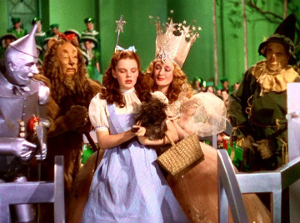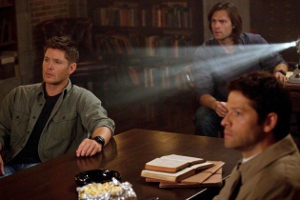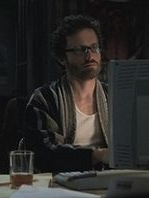That's Where You'll Find Me
 There's a misalignment in The Wizard of Oz.
There's a misalignment in The Wizard of Oz.
What is its moral? "There's no place like home." Dorothy has found herself in a land over the rainbow, and yet her ultimate desire — the fulfillment of which she asks of the Wizard — is to return to Kansas. Near the end, Glinda prompts Dorothy to articulate the lesson that she, Dorothy, has learned; and Dorothy replies:
Maybe Dorothy Sings About the Wrong Thing
Saturday, August 12, 2017 12:19 pm

What is its moral? "There's no place like home." Dorothy has found herself in a land over the rainbow, and yet her ultimate desire — the fulfillment of which she asks of the Wizard — is to return to Kansas. Near the end, Glinda prompts Dorothy to articulate the lesson that she, Dorothy, has learned; and Dorothy replies:
If I ever go looking for my heart's desire, I won't look any futher than my own backyard. Because if it's not there I never lost it to begin with.This lesson, of course, accords with the narrative facts that the Scarecrow, the Tin Man, and the Cowardly Lion each already had the thing he sought. The Scarecrow was already brainy; the Tin Man, full of heart; the Lion, courageous. And Dorothy, in Kansas, already had the place most free of trouble: her home with Aunt Em and Uncle Henry.
Flea Markets. In Spaaace!
The Peculiar Novel Quarter Share
Monday, March 13, 2017 1:16 pm
It's been difficult to find a good SF novel. Most, these days, are beset with SJW imbecility. But I keep trying the samples at Amazon. Once in a while a sample is good enough to prompt me to say, "What the heck, I'll finish this one." Quarter Share by Nathan Lowell was my latest choice.
But like pretty much all the books I have obtained hopefully after a decent-enough sample, QS has proven to be...
But like pretty much all the books I have obtained hopefully after a decent-enough sample, QS has proven to be...
Just Another Guy
 Generally I like what Supernatural does with Biblical mythology. Mind you, the writers are only scraping the mythology. They never explore the actual point of this or that story, but only steal from the cultural detritus of a society once Christian, re-purposing folktales they once half-heard in Sunday school.
Generally I like what Supernatural does with Biblical mythology. Mind you, the writers are only scraping the mythology. They never explore the actual point of this or that story, but only steal from the cultural detritus of a society once Christian, re-purposing folktales they once half-heard in Sunday school.
Take, for example, the arc about the Darkness and the Mark of Cain.
Beware! Spoilers follow.
God in Supernatural
Monday, January 23, 2017 8:00 pm

Take, for example, the arc about the Darkness and the Mark of Cain.
Beware! Spoilers follow.
An Inadequate Number of Robots
Hugo Awards 2015 - Short Stories
Sunday, June 14, 2015 10:42 am
I am a voter for the 2015 Hugo Awards. I am posting my thoughts about the candidate works. Be warned that spoilers abound.
There are five short stories on the Hugo list. I'll be referring to them using the following abbreviations.
OSP — On a Spiritual Plain by Lou Antonelli
PBB — The Parliament of Beasts and Birds by John C. Wright
SS — A Single Samurai by Steven Diamond
TT — Totaled by Kary English
TC — Turncoat by Steve Rzasa
My comments on these shorts will be short — and scattered.
There are five short stories on the Hugo list. I'll be referring to them using the following abbreviations.
OSP — On a Spiritual Plain by Lou Antonelli
PBB — The Parliament of Beasts and Birds by John C. Wright
SS — A Single Samurai by Steven Diamond
TT — Totaled by Kary English
TC — Turncoat by Steve Rzasa
My comments on these shorts will be short — and scattered.
The Goblin Emperor
Hugo Awards 2015 - Novel by Katherine Addison
Friday, May 29, 2015 6:59 pm
I am a voter for the 2015 Hugo Awards. I am posting my thoughts about the candidate works. Be warned that spoilers abound.
Maia, the half-goblin and youngest son of the Emperor of the Elflands, banished with his mother from the court, inherits the crown when the Emperor and all other his other sons are killed in an airship accident (which was, in fact, no accident). Maia is not at all prepared and has to find his place.
To begin with, this novel passed one of my standard tests: I never cringed at the dialogue. Sometimes I cringed at what was being said, but never the way it was being said. None of it was cloying or cute. Indeed, none of the writing made me cringe. That may seem like faint praise, but it's not. Addison's style is controlled and effective. She revealed things in a sound order, with a sound pacing. Things followed one another well and I wanted to keep reading. Her fantasy world did not dazzle me and seems a bit conventional (even to me, who doesn't read much fantasy), but it worked.
Maia, the half-goblin and youngest son of the Emperor of the Elflands, banished with his mother from the court, inherits the crown when the Emperor and all other his other sons are killed in an airship accident (which was, in fact, no accident). Maia is not at all prepared and has to find his place.
To begin with, this novel passed one of my standard tests: I never cringed at the dialogue. Sometimes I cringed at what was being said, but never the way it was being said. None of it was cloying or cute. Indeed, none of the writing made me cringe. That may seem like faint praise, but it's not. Addison's style is controlled and effective. She revealed things in a sound order, with a sound pacing. Things followed one another well and I wanted to keep reading. Her fantasy world did not dazzle me and seems a bit conventional (even to me, who doesn't read much fantasy), but it worked.
Ages as Bright as Any
Michael Flynn's Eifelheim
Saturday, June 21, 2008 9:37 pm
In seeking science fiction that is neither left-wing nor Christophobic, I would have thought the worst place to look would be in a novel about aliens crashing in a medieval German town. O! the opportunities to condemn the superstitious villainies of the Dark Ages! Beleaguered aliens — so like ourselves in their adherence to Science! — against the base and ignorant Catholicism of dim-witted villagers! Goodness me, the cliches write themselves.
Eifelheim is absolutely nothing like that. This is a work that depicts medieval Catholics with sympathy, not by supposing them to be unwashed Episcopalians who would vote Democratic if only they could, but by eschewing condescension and hatred — and, more to the point, by depicting the faithful Catholics as fully rational.
Eifelheim is absolutely nothing like that. This is a work that depicts medieval Catholics with sympathy, not by supposing them to be unwashed Episcopalians who would vote Democratic if only they could, but by eschewing condescension and hatred — and, more to the point, by depicting the faithful Catholics as fully rational.
A Bee Contemplates Buzzing
The Definition of High Art
Sunday, January 8, 2006 8:46 pm
Despite having been a writer for decades now and having had the unsurprising and frequent inclination, as a producer of art, to contemplate the nature of art, it was many years until I realized something that I think is very true.
Let me begin by stating the obvious: All works are not substantially equal. However much the academics might want to de-privilege the canon, there remains a qualitative difference between high art and low art. This, to be sure, is not news. If you think I am merely about to scoff at academics who overpraise hip-hop or graffiti, you would be wrong. Such academics, however much they perdure, have been adequately ridiculed already. My question is only this: Given the obvious fact that some art is high and some low, what is it, in the end, that distinguishes high from low? And my answer is this: Depth of information.
Let me begin by stating the obvious: All works are not substantially equal. However much the academics might want to de-privilege the canon, there remains a qualitative difference between high art and low art. This, to be sure, is not news. If you think I am merely about to scoff at academics who overpraise hip-hop or graffiti, you would be wrong. Such academics, however much they perdure, have been adequately ridiculed already. My question is only this: Given the obvious fact that some art is high and some low, what is it, in the end, that distinguishes high from low? And my answer is this: Depth of information.
© 2004-26 David Skinner · All rights reserved
